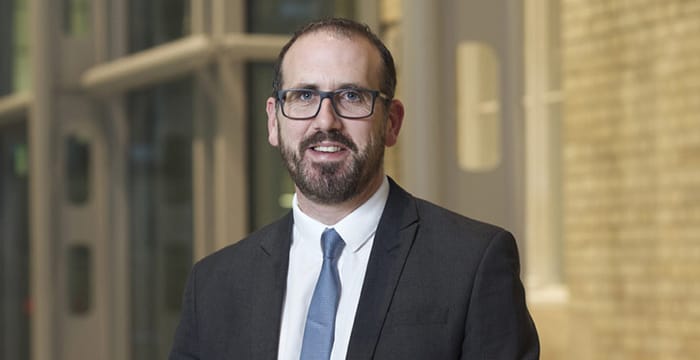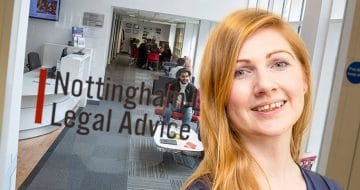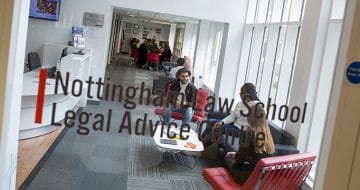Matthew J. Homewood sketches out vision for Solicitors Qualifying Exam preparation course that draws on university’s strength in teaching and research

Ahead of LegalEdCon North next Thursday in Manchester, Legal Cheek Careers caught up with Matthew J. Homewood, an associate professor at Nottingham Law School who is well known for his expertise in technology enhanced learning in legal education.
Legal Cheek Careers (LC): You are an expert in using technology in legal education. What ideas do you have in this respect for the SQE?
Matthew J. Homewood (MH): The Solicitors Qualifying Examination (SQE) provides a number of opportunities for innovative course development. The increased use of technology to enhance learning is but one of these. The important thing is that the use of such technology is pedagogy-led and is not just seen as a way to reduce costs and to tick a ‘we use technology’ box. Technology has the potential to engage students in new ways, to break down traditional classroom barriers and enable students to construct their own learning journeys and experience deeper learning.
This cannot be achieved by merely replacing face-to-face teaching with online recorded lectures while providing the odd multiple choice test. Rather, courses need to be designed which integrate technology to enhance the ‘traditional’ experience by providing genuinely interactive and immersive activities to enable students to acquire relevant knowledge and skills.
LC: Legal tech is becoming an increasingly important part of the junior lawyer skillset. What is the best way to develop such skills among students, both at undergraduate level and during the vocational training stage? And is the SQE shake-up an opportunity in this respect?
MH: Developments in legal technology are undoubtedly one of the most talked about aspects of legal practice and increasingly, the lawyers of the future are expected to show an appreciation of the impact they will have. In essence, legal tech is simply about the opportunities presented by technologies to enhance traditional delivery methods of legal services. We often read about exciting developments including ‘smart’ contracts, increasingly sophisticated artificial intelligence tools and practice management software, while it is common to hear talk of ‘blockchain’ and ‘bots’.
Despite this, experience teaches us that skills gaps still exist in technology that many would consider much more mundane yet remain of great importance to large and small firms alike, such as the use of spreadsheets and email clients.
We should be wary of assuming that the current generation are so-called ‘digital natives’, and we need to build the development of legal technology knowledge and skills in academic and vocational training, scaffolding appropriately. Such skills need to be developed and practiced in a legal context where beneficial outcomes can be fully appreciated rather than learning skills in a vacuum without application.
Beyond this, developing in students an understanding of not just what the technology can do, but encouraging computational thinking, will in turn lead to the development of future technological solutions. Again, the flexibility offered by the changes to legal education provide much scope for innovative providers to embed such developments.
LC: Do you envisage that the legal profession of 2030 will be a substantially different place to today? If so, how?
MH: I think the legal profession in 2030 will be a very different place to today. Technology will play an increasingly important role and will enhance efficiency and reduce costs, taking away much of the ‘grunt’ work that currently takes up so much of the traditional lawyers’ time. However, while the technology will be harnessed to do what it does best, a premium will be placed on those things it is unable to do, or those things where a human can simply do it better. In this way, the lawyers’ role will change, enabling them to engage in more creative roles requiring emotional involvement.
LC: What sets Nottingham Law School apart from the crowd as a vocational legal education provider?
MH: Nottingham Law School is part of Nottingham Trent University (NTU) which holds TEF Gold for excellence in teaching and is the Guardian’s University of the Year 2019. The university is also particularly proud to have been named University of the Year at the UK Social Mobility Awards. NTU is ranked third in the People and Planet Green League and embraces sustainability institution-wide across its academic schools, Students’ Union, operations and research. The law school enjoys an outstanding reputation for excellence in the delivery of vocational legal training and its continuous innovation in legal education is underpinned by research which pushes the boundaries of legal knowledge and practice.
Nottingham Law School students can take advantage of NTU’s excellent facilities and services, including outstanding student support services and employability advice, as well as an array of extra-curricular opportunities. Students are taught by an experienced practitioner team and have the opportunity to work on real client cases in the school’s multi-award-winning teaching law firm, the NLS Legal Advice Centre. The school also provides excellent learning and teaching spaces, including purpose built mock courtrooms, mooting rooms and conferencing rooms where students can develop key legal skills in an authentic environment.
Matthew J. Homewood will be speaking at LegalEdCon North on Thursday 30 January at The Lowry, Media City, Manchester. Final release tickets can be purchased here.
About Legal Cheek Careers posts.


